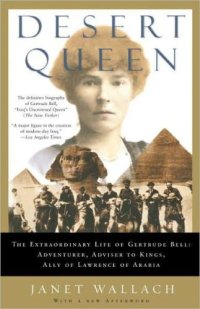
Ebook: Desert queen: the extraordinary life of Gertrude Bell, adventurer, adviser to kings, ally of Lawrence of Arabia
Author: Bell Gertrude Lowthian, Wallach Janet
- Tags: Colonial administrators, Colonial administrators--Great Britain, Orientalists--Great Britain, Spies, Spies--Great Britain, Travel, Travelers, Travelers--Great Britain, Women spies, Women spies--Great Britain, Women travelers, Women travelers--Great Britain, Biographies, Biography, Bell Gertrude Lowthian -- 1868-1926, Women spies -- Great Britain -- Biography, Orientalists -- Great Britain -- Biography, Colonial administrators -- Great Britain -- Biography, Women travelers -- Great Britain -- Biography, Spies --
- Year: 2005
- Publisher: Anchor
- City: London;Great Britain;Middle East
- Language: English
- mobi
Amazon.com Review
A biography of the woman who, indirectly, was the catalyst for many of the troubles in the Middle East, including the Gulf War. In 1918, Gertrude Bell drew the region's proposed boundaries on a piece of tracing paper. Her qualifications for doing so were her extensive travel, her fluency in both Persian and Arabic, and her relationships with sheiks and tribal and religious leaders. She also possessed an ability to understand the subtle and indirect politeness of the culture, something many of her colonialist comrades were oblivious to. As a self-made statesman her sex was an asset, enabling her to bypass the ladder of protocol and dive into the business of building an Empire.
From Publishers Weekly
To Sir Mark Sykes, the pre-WWI British Foreign Office Arabist, "that damned fool," Miss Bell, created an "uproar" wherever she went in the Middle East and was "the terror of the desert." Three social seasons were all a young lady of good family was allotted to snare a husband. Gertrude Bell (1868-1926) had thrice failed and received the consolation prize, a trip to Teheran to visit her uncle, the British envoy there. After that, she could not be kept close to the dank family manse in Northumbria but was drawn to the sun-drenched Middle East. Dominated even there by her Victorian father, head of a family-owned ironworks, she was denied permission to marry a moneyless diplomat. She refused?to her later regret?a married lover in the military and assuaged her disappointment by pressing British interests in Arab lands east of Suez, becoming in effect the maker of postwar Iraq. The first woman to earn a first-class degree in modern history at Oxford, she wrote seven influential books on the Middle East and, following WWI, was named oriental secretary to the British High Commission in Iraq. Not just another book about an eccentric lady traveler, this colorful, romantic biography tells of a woman with an inexhaustible passion for place that did not always substitute successfully for continuing heartbreak. Despite some maudlin passages, Wallach, coauthor with her husband, John Wallach, of Arafat, vividly evokes a memorable personality.
Copyright 1996 Reed Business Information, Inc.